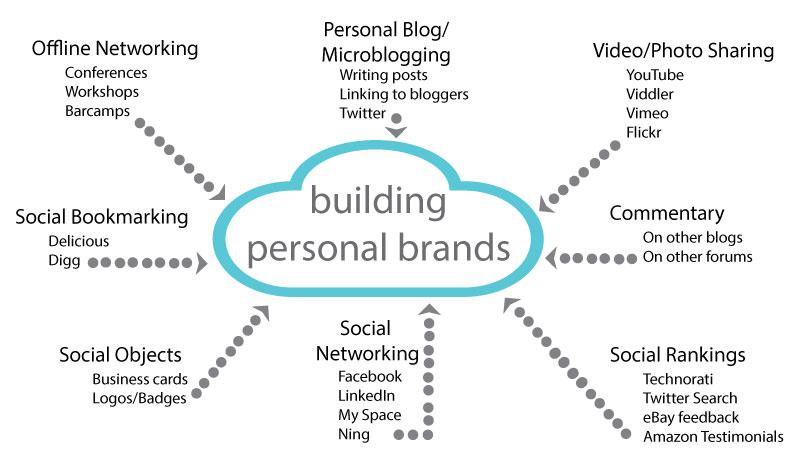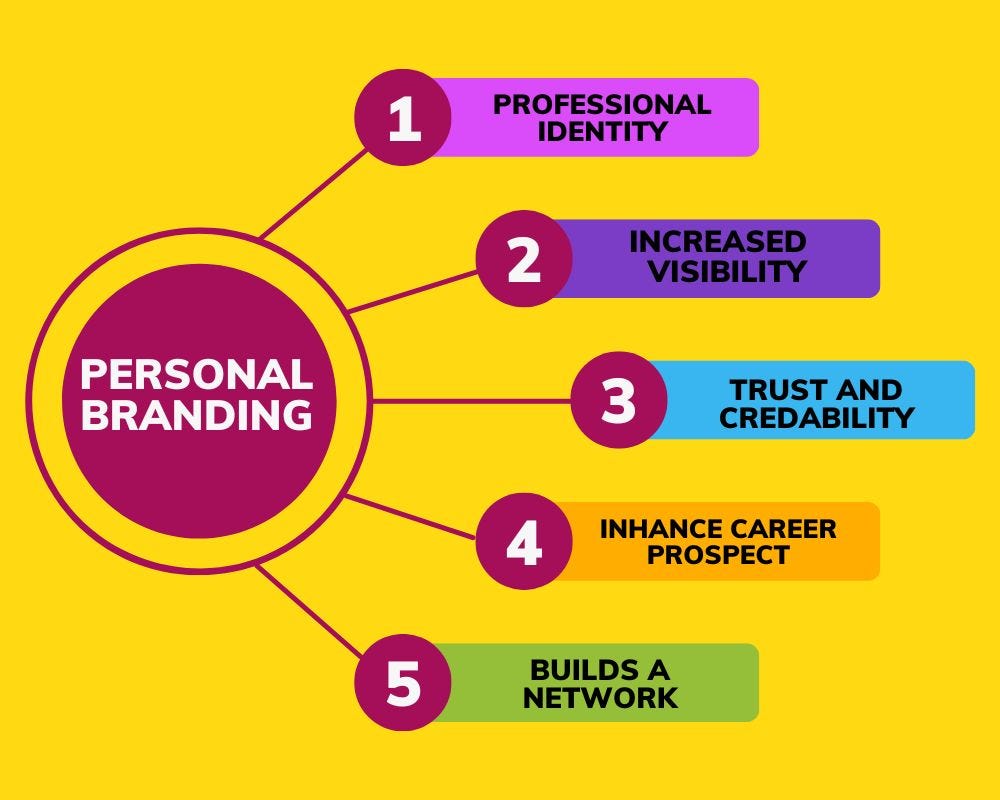Standing out from the crowd has never been more crucial in a world where we’re bombarded with information and choices. This is where building a personal brand comes into play. But what exactly is personal branding, and why does it matter?

In this article, we’ll dive into the concept of personal branding, its importance in various aspects of life, and provide some real-life examples to illustrate its significance.
Table of Contents
ToggleWhat is Personal Branding?
Let’s start with the basics. Personal branding is about showcasing your unique identity, values, and expertise to the world. It’s not just for celebrities or corporate executives – it’s for everyone. Think of it as the art of telling your story and shaping people’s perceptions of you.
Building a Personal Brand: Reasons Why It Matters
- Differentiation in a Crowded World: Imagine you’re in a sea of job applicants, all with similar qualifications. Your personal brand can set you apart from the rest. It’s like putting your unique spin on your resume – something that makes you memorable and exciting to potential employers.
- Trust and Credibility: Trust is the foundation of any successful personal or professional relationship. A solid personal brand can help you build trust and credibility in your field. People who recognize you as an expert or trustworthy individual are likelier to engage with you.
- Networking and Opportunities: Personal branding isn’t just about how others perceive you; it also opens doors to new opportunities. When you actively build your personal brand, you naturally attract like-minded individuals and opportunities aligned with your values and interests.
- Enhanced Self-Confidence: As you work on your personal brand, you become more aware of your strengths, weaknesses, and values. This self-awareness boosts your confidence and helps you navigate life’s challenges more effectively.
Building a Personal Brand: Why It Matters for Entrepreneurs
Entrepreneurs, in particular, benefit immensely from building a personal brand. When starting a new venture or seeking investors, your personal brand can be a powerful tool. Here’s why:
- Attracting Investors: Investors often invest in the idea and the person behind it. A well-defined personal brand can make you a more appealing investment option, as it demonstrates your commitment, expertise, and potential for success.Example: Richard Branson, the founder of the Virgin Group, has a personal brand that embodies adventure, innovation, and entrepreneurship. This brand has helped him secure funding for numerous ventures, from airlines to space travel.
- Building Customer Trust: Consumers are likelier to buy from a brand they trust. As an entrepreneur, your personal brand can build that trust. People who know and trust you are more likely to support your business.Example: Elon Musk, CEO of Tesla and SpaceX, is known for his personal brand as a visionary and innovator. This personal brand has attracted a dedicated customer base who believe in his mission to change the world through sustainable energy and space exploration.
List of free tools to help you in building your personal brand
- Canva: A graphic design tool for creating visuals and logos.
- Namechk: Check username availability on various social media platforms.
- Snappa: Design and editing tool for social media graphics.
- Rebrandly: A URL shortener with branded links.
- Trello: An organization and planning tool for brand projects and campaigns.
- Grammarly: A proofreading and editing tool.
- Lumen5: A video creation tool for social media.
- Brand Grader by HubSpot: Analyze your brand’s online presence.
- Followerwonk: Analyze Twitter followers and engagement.
- AnswerThePublic: Generate content ideas based on user queries
Why is Personal Branding Important for Students?
Students might not be in the job market yet, but personal branding can be incredibly valuable during their academic journey and beyond.
- Internship and Scholarship Opportunities: Having a well-defined personal brand can make you a more attractive candidate when applying for internships or scholarships. It shows potential employers and organizations that you’re not just another student but someone with a unique perspective and passion.Example: Amy, a college student studying environmental science, built a personal brand as a climate advocate. Her active involvement in environmental initiatives on campus caught the attention of a prestigious scholarship committee, leading to financial support for her studies.
- Networking for the Future: Personal branding also helps students connect with professors, peers, and professionals in their field of interest. These connections can provide valuable insights, mentorship, and job opportunities after graduation.Example: Mark, a student passionate about marketing, used his personal brand as a marketing enthusiast to connect with marketing professors and professionals on LinkedIn. This networking eventually led to an internship opportunity and guidance on career choices.
Importance of Personal Branding on Social Media
Social media is pivotal in shaping personal brands in today’s interconnected world. Here’s why it’s so crucial:
- Global Reach: Social media platforms offer an unprecedented opportunity to reach a global audience. Your personal brand can transcend geographical boundaries, allowing you to connect with people from diverse backgrounds.
- Authenticity Matters: Authenticity is key in personal branding on social media. People can spot inauthenticity from a mile away. Be true to yourself and your values, and your audience will respond positively.Example: Lilly Singh, a YouTube personality, built her personal brand on authenticity and humor. Her genuine and relatable content resonated with millions of viewers, making her one of the most successful YouTubers.
Building a Personal Brand: Strategy and Types
Now that we’ve established the importance of personal branding let’s discuss some strategies and types of personal branding you can explore:
Personal Branding Strategy
- Define Your Purpose: Identify your values, passions, and long-term goals. Your personal brand should reflect these core elements of your identity.
- Consistency is Key: Maintain a consistent online and offline presence. Your personal brand should be evident in your behavior, appearance, and the content you share.
- Engage with Your Audience: Building a personal brand is a two-way street. Engage with your audience by responding to comments, participating in discussions, and seeking feedback.
- Evolve: Personal branding isn’t static. As you grow and evolve, your personal brand may change too. Be open to adapting your brand to reflect your current aspirations and values.
Types of Personal Branding
- Expertise-Based Branding: Position yourself as an expert in a specific field or niche. Share your knowledge through articles, blog posts, or speaking engagements.
- Passion-Driven Branding: Showcase your passion for a particular cause or hobby. This type of branding can be compelling in attracting like-minded individuals.
- Innovative Branding: Highlight your innovative thinking and problem-solving skills. This type of branding is ideal for entrepreneurs and creative professionals.
- Relational Branding: Emphasize your ability to build strong relationships and connect with people. This can be valuable in various fields, from sales to leadership.
Final Thoughts
In conclusion, building a personal brand is not just a buzzword; it’s a fundamental aspect of modern life. Whether you’re a student, an entrepreneur, or someone navigating the job market, your personal brand can open doors, build trust, and help you stand out in a crowded world. By defining your purpose, staying authentic, and engaging with your audience, you can craft a personal brand that reflects who you are and what you want to achieve.
So, why does personal branding matter? It matters because it’s the key to unlocking your full potential and making a lasting impact on the world. Start building your personal brand today and watch new opportunities and connections emerge.
Read next: How to Turn Your Business Goals into Social Media Goals





